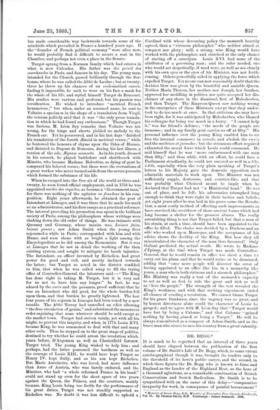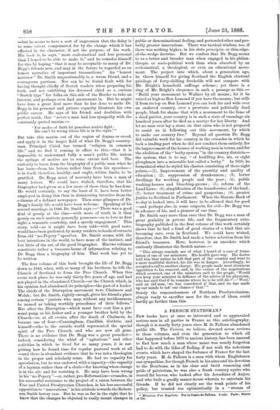DR. BEGG.*
IT is much to be regretted that an interval of three years should have elapsed between the publication of the first volume of Dr. Smith's Life of Dr. Begg, which, to some extent autobiographical though it was, brought its readers only to the threshold of its hero's public career, and the second, in which there figures the Dr. Begg who is known to fame and England as the Leader of the Highland Host, as the hero of a thousand agitations, as a remarkable combination of Scotch Conservatism and Scotch Radicalism. Dr. Smith is to be sympathised with on the cause of this delay—" comparative incapacity for work, in consequence of painful bereavement" • Memoirs of James Begg. D.D., Minister of Newington Free Church, Edinburgh. Vol. II. By Thomas Bush, D.D. Edinburgh: James (lemma% 1888.
—but he seems to have a sort of impression that the delay is to some extent compensated for by the change which it has effected in the character, if not the purpose, of his work. His book is, he says, "more ecclesiastical and less personal than I hoped to be able to make it," and he consoles himself for this by hoping "that it may be acceptable to many of Dr. Begg's friends now, and may in the future be regarded as an honest narrative of important transactions." An "honest narrator" Dr. Smith unquestionably is, a warm friend, and a courageous partisan. Nor can he be found fault with for having thought chiefly of Scotch readers when preparing his book, and not exhibiting his deceased chief as a curious -" Scotch type" for folks on this side of the Border to take an interest, and perhaps even find amusement in. But he might have done a great deal more than he has done to make Dr. Begg in his personal and private capacity illustrate his own public career. He says of his friend, and doubtless with perfect truth, that "never a man had less sympathy with the constantly quoted maxim :— For modes of faith let graceless zealots fight : His can't be wrong whose life is in the right.' " But take this maxim out of the region of dogma or creed, and apply it in the larger field of what Dr. Begg's country- man, Principal Caird, has termed "religion in common life," and we find it coming in effect to this,—that it is impossible to understand fully a man's public life, unless the springs of motive are to some extent laid bare. The curiosity to learn from the biography of a public man what he has been—from his letters rather than from his speeches— is in itself, therefore, healthy, and ought, within limits, to be gratified. Dr. Begg must of necessity have been a man of many letters. We could have wished, therefore, that his biographer had given us a few more of these than he has done. He would certainly, to say the least of it, have been better employed in doing this than in disinterring invective from the columns of a defunct newspaper. Then some glimpses of Dr. Begg's family life would have been welcome. Speaking of his second marriage, in 1846, Dr. Smith says :—" There was a good deal of gossip at the time—with more of truth in it than gossip on such matters generally possesses—as to love at first sight, a romantic courtship, and a speedy engagement." This story, told—as it might have been told—with good taste, would have been preferred, by many readers, to loads of extracts from old " no-Popery " speeches. Dr. Smith seems, with the best intentions in the world, to have none of the instinct, and but little of the art, of the good biographer. His two volumes constitute rather a treasure-house of infgrmation relating to Dr. Begg than a biography of him. That work has yet to be written.
The first volume of this book brought the life of Dr. Begg down to 1843, when, with so many of his brethren, he left the Church of Scotland to form the Free Church. When this event took place, he was only thirty-five years of age, and had not played in the abandoned Church—or the Church which, in his opinion, had abandoned its principles—the part of a leader. The chiefs of the Disruption movement were Chalmers and Welsh ; but Dr. Smith, rightly enough, gives his friend a place among certain "juniors who may, without any invidiousness, be named as taking worthily precedence of their fellows." But after the Disruption—which must have cost him a per- sonal pang, as his father and a younger brother held by the Church—or, at all events, after the death of Chalmers, he became one of four—Cunningham, Candlish, Guthrie, and himself—who to the outside world represented the special spirit of the Free Church, and who are now all gone. There is no evidence that Dr. Begg was a great preacher— indeed, considering the whirl of " agitations " and other activities in which he lived for so many years, it is sur- prising how he found time for regular pastoral work at all —and there is abundant evidence that he was not a theologian in the proper and scholarly sense. He had no capacity for speculation, but he was endowed with a capacity—the capacity of a layman rather than of a cleric—for knowing when change is in the air, and for resisting it. He may have been wrong in his "no-Popery "—or, rather, pro-Reformation—crusades, in his successful resistance to the project of a union between the Free and United Presbyterian Churches, in his less successful opposition to" innovations," in his attitude towards the Robert- son Smith heresy case. But he was so far in the right that he knew that the changes he objected to really meant changes in public or denominational feeling, and portended other and pro- bably greater innovations. There was tactical wisdom, too, if
there was nothing higher, in his obsta prineipiis, or thin-edge- of-the-wedge doctrine. But we confess that Dr. Begg seems
to us a better and broader man when engaged in his philan- thropic or socio-political work than when absorbed by an ecclesiastical, a theological, or even an educational move- ment. The project into which, about a generation ago, he threw himself for giving Scotland the English electoral privilege of forty-shilling freeholds will not compare with Mr. Bright's household suffrage scheme ; yet there is a ring of Mr. Bright's eloquence in such a passage as this :— " Build your monument to Wallace by all means ; let it be raised as high as Ben Lomond if you have the means ; but stills if from its top on Ben Lomond you can look far and wide over an enslaved country, over a prostrate and politically dead people, blush for shame that with a monument to the fame of a dead patriot, your country is in such a state of vassalage six hundred years after he died as a martyr for her liberty. And let no man ever lay a stone on that cairn who is not prepared to assist us in following out this movement, by which to make our country free." Beyond all question Dr. Begg did valuable work for his country in the crusades in which he took a leading part when he did not conduct them entirely, for the improvement of the houses of working men in towns, and for the abolition of the" bothy system "in the country districts,— the system, that is to say, "of huddling five, six, or eight ploughmen into a miserable hut called a bothy." In 1850, he formulated what he styled his charter, consisting of these eight points,—(1), Improvement of the quantity and quality of education ; (2), suppression of drunkenness ; (3), better dwellings for working people and the poor ; (4), public washing-houses and bleaching-greens ; (5), reform of the Land Laws ; (6), simplification of the transference of the land ; (7), better treatment of crime and pauperism ; (8), greater justice to Scotland in Parliament. When the Statute-Book of to-day is looked into, it will have to be allowed that for good —and perhaps also, in some respects, for evil—Dr. Begg was in advance of his, and a pioneer of our time.
Dr. Smith says more than once that Dr. Begg was a man of great geniality in private life, and the fragmentary auto- biography published in the first volume of this work certainly shows that he had a fund of good stories of a kind that are becoming rare, even in Scotland. We could have wished, therefore, that Dr. Smith had made a better selection from his friend's treasures. Here, however, is an anecdote which curiously illustrates the Scotch nature :—
" This always reminds me of what I heard of a case of trans- lation of one of our ministers. His health gave way. His doctor told him that unless he left that part of the country and went to a more healthful district, his life was in danger. Accordingly, he accepted a call to another charge. His people made most strenuous opposition to his removal, and, in the course of the negotiations which occurred, one of the ministers said to the people, Would you keep your minister in defiance of the advice of his physician, who has said that if he remains where he is he will die ?'—' Weel,' said an old man, we has considered a' that, and we hue made up our minds to Ink' our chance o' that."
Surely the remorselessness of Northern Presbyterianism, always ready to sacrifice men for the sake of ideas, could hardly go farther than this.







































 Previous page
Previous page